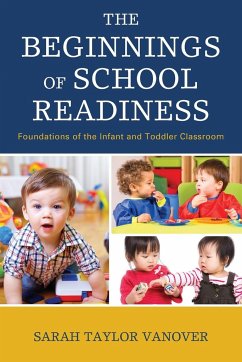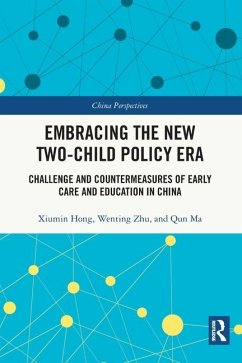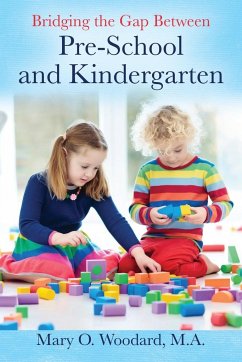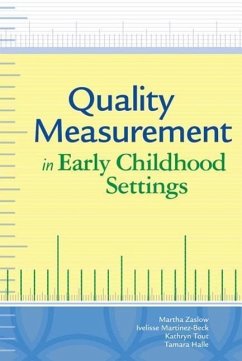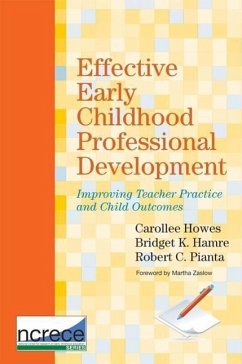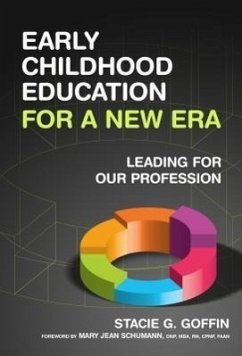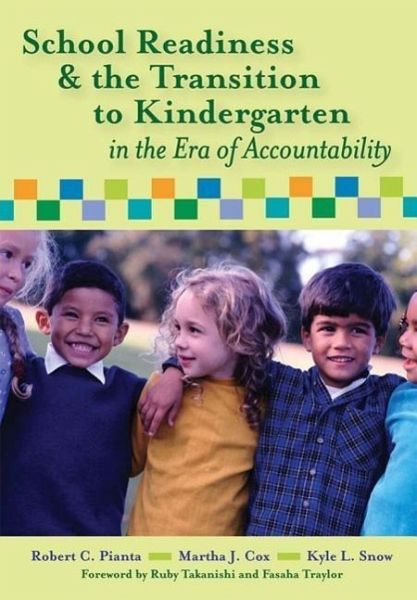
Broschiertes Buch
School Readiness and the Transition to Kindergarten in the Era of Accountability
Versandkostenfrei!
Versandfertig in über 4 Wochen

PAYBACK Punkte
20 °P sammeln!




This book presents state-of-the-art knowledge about the kindergarten transition period and examines this knowledge in terms of its implications for pressing policy, practice, training, and research issues for the next decade. Readers will understand what has changed in terms of early education policy and implementation. These changes include assessment and program opportunities (NCLB, Head Start Outcomes Framework); critical issues in the preschool to grade 3 years, such as health, emotional and attention regulation, and child functioning. This volume also addresses pertinent community influen...
This book presents state-of-the-art knowledge about the kindergarten transition period and examines this knowledge in terms of its implications for pressing policy, practice, training, and research issues for the next decade. Readers will understand what has changed in terms of early education policy and implementation. These changes include assessment and program opportunities (NCLB, Head Start Outcomes Framework); critical issues in the preschool to grade 3 years, such as health, emotional and attention regulation, and child functioning. This volume also addresses pertinent community influences in early education demographic changes, racial and cultural influences, and the roles of fathers in the transition process. This volume focuses on the individual child's development and background rather than on groups of children (at risk, with disabilities, from low-income families).
Robert C. Pianta, Ph.D., is Dean of the Curry School of Education, Director of the Center for Advanced Study in Teaching and Learning and Novartis U.S. Foundation Professor of Education at the University of Virginia, Charlottesville. A former special education teacher, Dr. Pianta is a developmental, school, and clinical child psychologist whose work focuses on assessment and improvement of teacher-student interactions and their role in fostering children's learning and development. Dr. Pianta is a principal investigator on several major grants including the National Center for Research in Early Childhood Education and the Virginia Education Sciences Training Program, and he has worked closely with the Gates Foundation-funded Measure of Effective Teaching project. He is the author of more than 250 journal articles, chapters, and books in the areas of early childhood education, teacher performance assessment, professional development, and teacher-child relationships, and he consults regularly with federal agencies, foundations and universities. Martha J. Cox, Ph.D., is Director of the Center for Developmental Science and Professor of Psychology at the University of North Carolina at Chapel Hill. Dr. Cox is known for her studies of families and young children and for her methodological contributions to the observational analysis of family interactions. Since the 1980s, she has studied the early years of family development and the processes of reorganization of families over the transition to parenthood and the transition to school with a special emphasis on the role of family relationships, including parent-child and marital relationships in children's successful adaptation to new challenges in the early years. She is 1 of 10 principal investigators in the NICHD Study of Early Child Care, a study of children from birth through the elementary school years. She is Principal Investigator of the National Science Foundation-funded North Carolina Child Development Research Collaborative (CDRC). A centerpiece of the CDRC activities is a longitudinal, collaborative, multidisciplinary research study focusing on multiple levels of factors associated with successful development of a diverse group of young children. Dr. Cox is also the Co-principal Investigator of the program project Rural Children Living in Poverty, funded primarily by the National Institute of Child Health and Human Development but also by the National Institute on Drug Abuse. The purpose of this program project is to understand the early school readiness of an understudied but important group of children: impoverished children living in low-resource, rural areas of the country. Kyle L. Snow, Ph.D., is Program Director for research in early childhood education at Research Triangle Institute (RTI) International. He is also Principal Investigator for the Early Childhood Longitudinal Study-Birth (ECLS-B) cohort, a prospective longitudinal study of a nationally representative cohort of children studied from 9 months to kindergarten. Dr. Snow has also held a faculty appointment at Wilkes University in Wilkes-Barre, Pennsylvania, and taught courses at Cornell University, American University, and Seton Hall University. Dr. Snow holds a bachelorâ (TM)s degree in psychology from Castleton State College in Vermont and masterâ (TM)s and doctoral degrees in human development from Cornell University. Dr. Snowâ (TM)s areas of specialization include infant and child development, the interface between early social and cognitive development, and childrenâ (TM)s transition to school. Ruby Takanishi, Ph.D., President and CEO, Foundation for Child Development, 295 Madison Avenue, 40th Floor, New York, New York 10017. Dr. Takanishi works at the Foundation for Child Development, which initiated a 10-year commitment to promoting the integration of early learning programs with K-12 education reform in 2003. Her interest in how research on children's development can inform public policy and programs is a lifelong concern. Jeanne Brooks-Gunn, Ph.D., Virginia and Leonard Marx Professor of Child Development and Education, Teachers College and College of Physicians and Surgeons, Columbia University, 525 West 120th Street, Box 39, 254 Thorndike, New York, New York 10027. Dr. Brooks-Gunn directs the National Center for Children and Families (http: //www.policyforchildren.org). She is interested in factors that contribute to both positive and negative outcomes across childhood, adolescence, and adulthood, with a particular focus on key social and biological transitions over the life course. Richard M. Clifford, Ph.D., has training in educational administration with specializations in political science and research. He has taught and has served as a principal in public schools. For more than 25 years, he has studied public policies and advised government officials and practitioners on policies affecting children and families. His work focuses on two major areas: public financing of programs for young children and the provision of appropriate learning environments for preschool and early school-age children. Dr. Clifford is co-author of a widely used series of instruments for evaluating learning environments for children, including the Family Day Care Rating Scale (FDCRS; Teachers College Press, 1989), co-authored with Thelma Harms, and the Infant/Toddler Environment Rating Scale (ITERS; Teachers College Press, 1990) and the Early Childhood Environment Rating Scale0-Revised Edition (ECERS-R; Teachers College Press, 1998), both co-authored with Thelma Harms and Debby Cryer. In 1993-1994, Dr. Clifford helped establish and served as the first director of the Division of Child Development in the North Carolina Department of Human Resources and helped with the design and implementation of the state's Smart Start early childhood initiative. He is a past president of the National Association for the Education of Young Children (NAEYC). Jason T. Downer, Ph.D. is a licensed clinical psychologist and Director of the Center for Advanced Study of Teaching and Learning at the University of Virginia. His research emphasizes the promotion of children's academic and social competence through targeted and preventive interventions during early schooling. Specifically, he engages in developing and evaluating school‐based teacher consultation and prevention programming designed to enhance teacher practices and provide students with equitable learning opportunities that increase academic success and strengthen social‐emotional skills. He is an academic 'grandchild' of Dr. Fantuzzo, and forever grateful for John's sage advice and modeling of community‐engaged scholarship. Linda Espinosa, Ph.D., has had experience as a preschool teacher, child care center director, elementary school principal, central office administrator, State program director, and corporate Vice President of Education. Her practical experience and research interests focus on the design and evaluation of optimal learning environments for young children who are at risk for school failure. Dr. Espinosa has worked extensively with low-income Hispanic/Latino children and families throughout the state of California. She completed her B.A. at the University of Washington, her Ed.M. at Harvard University and her Ph.D. in Educational Psychology at the University of Chicago. Bridget K. Hamre, Ph.D., is Research Associate Professor in the Curry School of Education and Associate Director of University of Virginiaâ (TM)s Center for Advanced Study of Teaching and Learning (CASTL). Dr. Hamreâ (TM)s areas of expertise include student-teacher relationships and classroom processes that promote positive academic and social development for young children, and she has authored numerous peer-reviewed manuscripts on these topics. This work documents the ways in which early teacher-child relationships are predictive of later academic and social development and the ways in which exposure to high-quality classroom social and instructional interactions may help close the achievement gap for students at risk of school failure. Dr. Hamre leads efforts to use the CLASS(TM) tool as an assessment, accountability, and professional development tool in early childhood and other educational settings. Most recently, she was engaged in the development and testing of interventions designed to improve the quality of teachersâ (TM) interactions with students, including MyTeachingPartner and a 14-week course developed for early childhood teachers. Dr. Hamre received her bachelorâ (TM)s degree from the University of California, Berkeley, and her masterâ (TM)s degree and doctorate in clinical and school psychology from the University of Virginia. Sharon Lynn Kagan, Ed.D., Virginia and Leonard Marx Professor of Early Childhood and Family Policy and Co-director of the National Center for Children and Families, Teachers College, Columbia University, 525 West 120th Street, Box 226, New York, New York 10027. Dr. Kagan is Professor Adjunct at Yale University's Child Study Center. Through her leadership in the field and her 15 books and 250 articles, Dr. Kagan has helped shape early childhood practice and policies in the United States and in countries throughout the world. Samuel Meisels, Ed.D., is a leading authority on early childhood development and assessment. Before joining the Buffett Early Childhood Institute he was president of Erikson Institute for 12 years and remains president emeritus. In addition, he had a 21‐year research career at the University of Michigan, where he is an emeritus professor and research scientist. Earlier he was on the faculty at Tufts University and director of the Eliot‐Pearson Children's School. He has authored more than 200 publications and assessment instruments and holds Master's and doctoral degrees from the Harvard Graduate School of Education and an honorary doctor of humane letters from Roosevelt University. C. Cybele Raver, Ph.D., Professor, Department of Applied Psychology, The Steinhardt School of Culture, Education and Human Development, New York University, Kimball Hall, 246 Greene Street, Room 403W, New York, New York 10003. Dr. Raver directs New York University's Institute of Human Development and Social Change. Her research focuses on self-regulation and school readiness among young children facing economic hardship, and she examines the mechanisms that support children's positive outcomes in the policy contexts of welfare reform and early educational intervention.
Produktdetails
- Verlag: Brookes Publishing Company
- Seitenzahl: 392
- Erscheinungstermin: 23. Februar 2007
- Englisch
- Abmessung: 256mm x 179mm x 24mm
- Gewicht: 679g
- ISBN-13: 9781557668905
- ISBN-10: 1557668906
- Artikelnr.: 21110569
Herstellerkennzeichnung
Libri GmbH
Europaallee 1
36244 Bad Hersfeld
gpsr@libri.de
Für dieses Produkt wurde noch keine Bewertung abgegeben. Wir würden uns sehr freuen, wenn du die erste Bewertung schreibst!
Eine Bewertung schreiben
Eine Bewertung schreiben
Andere Kunden interessierten sich für


